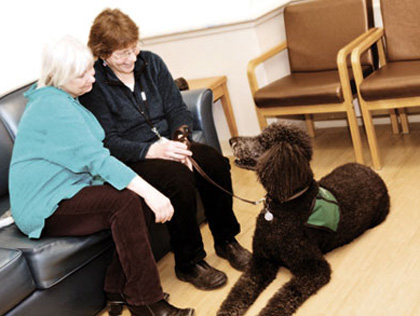Adopting A Best Friend
 The prospect of having a trusty companion who loves you no matter what, always welcomes you home, and never argues with you entices many people to get a pet. Improved physical and mental health may be another perk.
The prospect of having a trusty companion who loves you no matter what, always welcomes you home, and never argues with you entices many people to get a pet. Improved physical and mental health may be another perk.
A variety of studies reveal that many people value their closeness to their pets, such as dog owners who were as emotionally close to their dogs as to their closest family member. Other studies indicate that pets have a positive effect on human interactions. For example, one found that when a person takes a walk in the park with a dog, more responses and more lengthy conversations take place with other people than when that same person takes a walk alone. Also, people who are physically impaired or who have mental health disorders notice that when they are accompanied by a dog, other people are more likely to socialize with them rather than ignore or avoid them.
Many studies have found that pets can increase feelings of wellbeing, increase social functioning, increase mental capabilities, and decrease anxiety and despair, particularly for seniors.
"Pets are a great source of comfort and offer older adults a sense of purpose and joy from caring for another being. This reinforces pleasant memories about prior pet ownership, or even reminders of caring for other family members," says Nancy Reed, Operations Leader for the Memory Support Program at Hebrew SeniorLife.
The Centers for Disease Control and Prevention states that pets can decrease a person's cholesterol and blood pressure levels, as well as feelings of loneliness, while they increase one's opportunities for exercise, outdoor activities, and socialization. One study found that married couples with pets had decreased resting blood pressure and heart rate compared with couples without pets.
Studies also reveal that individuals in nursing facilities and those with Alzheimer's disease or dementia seem to benefit from both pet ownership and other animal interactions in terms of their mood, loneliness, social behaviors, and caloric intake. Similarly, some psychiatric patients appear to function better with the help of therapy animals.
But before you run out to adopt a pet, Reed says there are some issues to consider.
"For seniors who have less mobility, a cat or older dog who requires less walking is a safer bet. Also, allergies and disease transmission are concerns for elderly who may have a compromised immune system," she says. There are dogs that have hair rather than fur, which are more hypoallergenic, and some cats are hairless.
"The benefits of owning a pet far outweigh the risks, though, and providing seniors with the right supports to care for a pet brings endless benefits—both medical and psychological—as well as a constant and loyal friend that brightens their day," says Reed.
Above content provided by Beth Israel Deaconess Medical Center, in partnership with Hebrew SeniorLife. For advice about your medical care, consult your doctor.
Posted July 2012



